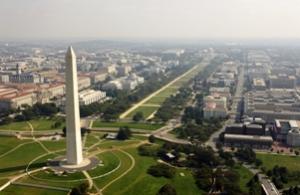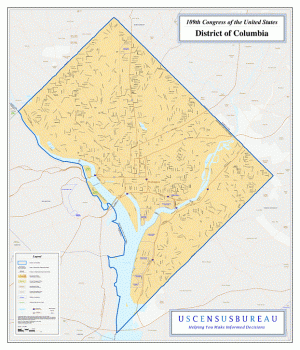Washington, DC Mayor Vincent Gray Monday signed the marijuana decriminalization bill passed last month by the city council. It's not quite a done deal yet, though -- Congress has 60 working days to object, but to stop the bill, it must pass a resolution blocking it, and President Obama must sign it. So it appears likely that the nation's capital will have decriminalized pot possession by the time Congress leaves town for the August recess.

The decriminalization bill, the Marijuana Possession Decriminalization Amendment Act of 2014 (Council Bill 20-409) makes possession of less than an ounce of marijuana a civil offense punishable by a fine of only $25 (the cheapest of any decriminalization state). It also explicitly prohibits police from using the smell of marijuana as a pretext for stopping and searching people.
The bill advanced through the DC political process on a wave of concern that marijuana laws in the nation's capital were being enforced in a racially discriminatory fashion and is seen by council members and advocates alike as a model for reducing racial disparities in the criminal justice system.
Last July, the American Civil Liberties Union released The War on Marijuana in Black and White, which found that black people in the District are eight times more likely to be arrested for marijuana possession than whites, and the Washington Lawyers' Committee on Civil Rights and Urban Affairs released Racial Disparities in Arrests in the District of Columbia, 2009-2011, which found that blacks accounted for nine out of 10 drug arrests in the District.
Those grim realities were at the forefront as a broad spectrum of DC faith, community, and advocacy groups praised Mayor Gray's signing of the bill.
"The passing of the decriminalization marijuana bill is the first step in the right direction to dismantling the immoral war on drugs that has devastated communities of color," said Rev. Kelly D. Wilkins with the Covenant Baptist United Church of Christ.
"Although I do not advocate or condone the use of marijuana, I support this bill because far too many of our people have been targeted, locked up, thrown away and placed outside of our society due to a small amount of marijuana, said Reverend George C. Gilbert, Jr. with Holy Trinity United Baptist Church.
"This bill is one of the first measures to address racial profiling in drug arrests, both procedurally and substantively. We are confident that Congress shares the District's concerns about disparities in enforcement and the disturbing trends we are seeing nationwide," said Patrice Amandla Sulton with the NAACP DC Branch.
"This historic legislation exists because DC residents and their leaders decided to change an ugly reality: Black people are stopped, searched, and arrested under marijuana prohibition far more than whites, when both groups use the drug at similar rates," said Seema Sadanandan, Program Director at the ACLU of the Nation's Capital.

If and when the law goes into effect, DC will join 17 states that have already decriminalized small-time marijuana possession. But passage of the decriminalization bill into law is by no means the end to marijuana politics in the District -- in fact, it could be just a first step on a path toward outright legalization, either through the council or through the initiative process.
Before the council right now is a full-blown marijuana legalization bill, Council Bill 20-466, which has been sitting in the Judiciary and Public Safety Committee since it was introduced last fall by Councilmember David Grosso.
And waiting in the wings is the DC Cannabis Campaign, whose marijuana legalization initiative has just been approved for signature-gathering.
"I congratulate Mayor Gray for signing this practical reform that should result in fewer people being burdened with a trip to the courthouse for small amounts of marijuana. More people than ever are hopeful the mayor will next support full legalization," said the campaign's chairman, Adam Eidinger.
Given time limitations, Eidinger and the DC Cannabis Campaign can't sit around waiting for the city council to act or for a new mayor to be chosen. They need to start gathering signatures now if they are to try to qualify for the November ballot. They only have until July 7 to come up with 25,000 valid voter signatures, but if they do, the passage of the decriminalization bill may be a significant victory that ends up forgotten in the accelerating rush toward repealing pot prohibition.
Comments
Referendum in DC
What happens if such a referendum in DC clashes with federal law and is not blocked by Congress? Is this law no longer enforced there or automatically changed altogether for the entire US?
Add new comment